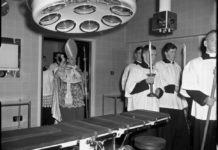Despite a long illness, the death of Peter Short came as a shock to his many friends and comrades throughout Ireland, Britain, the US and many other parts of the world. If one mentioned his name to any person in Louth, they would immediately refer to the Workers’ Party.
From an early age Peter was involved in revolutionary politics in Ireland, never wavering for fifty years in the struggle of the working class to secure their rights, justice, freedom and socialism. An active party member, Peter could be found pounding the streets of Dundalk distributing literature, raising funds, engaging warmly with ordinary working people, or as a regular attender at party events and activities, frequently in the company of his lifelong comrade, Mark McLoughlin, who predeceased him by less than a year.
Peter represented the Workers’ Party in many election campaigns and was a stalwart campaigner for the Louth County Hospital in Dundalk. His experiences in the merchant navy demonstrated forcefully to him the plunder and exploitation of peoples across the world and forged his strong and enduring commitment to internationalism and international solidarity.
Peter had three great loves in his life; Josie, his wife and wonderful companion, his class and the party of that class, and traditional music. Every year without fail, Peter would travel to Fleadh Ceoil na hEireann no matter how far away it was. He was a regular and popular figure at Mark’s Bar in Dundalk and Tommy Sands mentions him playing there, referring to “Shorty on the bodhrán”, in the song ‘Peter’s Song’. He was a staunch member of Comhaltas Ceolteóirí Eireann and played his part in the ongoing campaign to guard and preserve our culture.
Peter Short’s contribution to our class, our party and our country will be long remembered. A modest, unassuming man, and yet a man of great wit and humour who enjoyed the company of his comrades and friends, he unfailingly demonstrated his loyalty and commitment and proved over many decades that he knew what the struggle was about.
A modest, unassuming man, who enjoyed the company of his comrades and friends, he proved over many decades that he knew what the struggle was about
A life-long republican in the tradition of Tone and Connolly, who knew his republicanism and who understood clearly what it was about, he was a steadfast and reliable adversary of those who sought to transform it into sterile nationalist rhetoric or to divert it down the path of narrow sectarian triumphalism. Never impatient, he knew that the task of building a class conscious party of the working class would take time and much effort. He stood steadfast against both Provisional and IRSP threats never doubting that his belief in a class based party would survive the sectarian onslaught.
Peter‘s view has been borne out over recent years when those who sought to divide, who engaged in sectarian slaughter for decades are now securely installed in an administration of what they termed a failed state at the behest of rightwing Governments in London and Dublin. Over the years Peter, along with a few comrades, maintained a viable organisation in Louth despite the worst efforts of Provos and fellow travellers to sideline him. No matter how difficult the situation was Peter stood his ground and never allowed the enemies of his class or his party to silence him.
One of the most difficult times in Peter‘s political life and his membership of the Workers Party was the betrayal in 1992 by an opportunistic grouping Democratic Left. Along with his lifelong friend and comrade, the late Mark McLoughlin, Peter spoke long and hard on this betrayal. He always said he would never forgive. He would often say, “That the motley crew which made up DL never had to risk their lives or put their hands in their pockets as the poorest of our members had to do over the years.”
Never despondent, even in the last weeks of his life when he had become seriously ill, he resolutely maintained that contact and comradeship that was so much a part of his life.
Peter Short stood proudly with the Workers’ Party throughout the darkest of days, never faltering or wavering in his undiminished belief that one day the working class would be in charge of its own destiny in a workers’ republic. He spent his life working to make that a reality. When I think of Peter now I think of these words – “Mourn not the dead that in the cool earth lie. Dust unto dust. The calm, sweet earth that mothers all who die as all men must. But rather mourn the apathetic throng The cowed and the meek. Who see the world’s great anguish and its wrong And dare not speak!” He was held in deep affection by his many comrades and friends.
We convey our most sincere condolences to Josie, Peter’s wife and life companion, and to his extended family, brother and sister, nephews and nieces.
By Sean Garland





